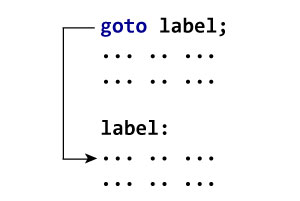goto语句使我们可以将程序的控制权转移到指定的标签 。
goto语句的语法
goto label;
... .. ...
... .. ...
label:
statement;
标签是标识符。遇到goto语句时,程序的控制跳至label:并开始执行代码。

示例:goto语句
// Program to calculate the sum and average of positive numbers
// If the user enters a negative number, the sum and average are displayed.
#include
int main() {
const int maxInput = 100;
int i;
double number, average, sum = 0.0;
for (i = 1; i <= maxInput; ++i) {
printf("%d. Enter a number: ", i);
scanf("%lf", &number);
// go to jump if the user enters a negative number
if (number < 0.0) {
goto jump;
}
sum += number;
}
jump:
average = sum / (i - 1);
printf("Sum = %.2f\n", sum);
printf("Average = %.2f", average);
return 0;
} 输出
1. Enter a number: 3
2. Enter a number: 4.3
3. Enter a number: 9.3
4. Enter a number: -2.9
Sum = 16.60
Average = 5.53避免goto的原因
使用goto语句可能会导致错误且难以理解的代码。例如,
one:
for (i = 0; i < number; ++i)
{
test += i;
goto two;
}
two:
if (test > 5) {
goto three;
}
... .. ...
另外, goto语句允许您执行不良操作,例如跳出范围。
话虽如此, goto有时会很有用。例如:打破嵌套循环。
您应该使用goto吗?
如果您认为使用goto语句简化了程序,则可以使用它。话虽如此, goto很少有用,并且您可以在不完全使用goto情况下创建任何C程序。
这是C++的创建者Bjarne Stroustrup的话:“’goto’可以做任何事情的事实正是我们不使用它的原因。”